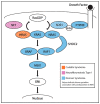Pediatric Rhabdomyosarcoma: Epidemiology and Genetic Susceptibility
- PMID: 34065162
- PMCID: PMC8125975
- DOI: 10.3390/jcm10092028
Pediatric Rhabdomyosarcoma: Epidemiology and Genetic Susceptibility
Abstract
Rhabdomyosarcoma (RMS) is the most common soft-tissue sarcoma in children, yet little is known about its etiology. Studies that examine either environmental exposures or germline genetic predisposition in RMS have begun to identify factors that contribute to this malignancy. Here, we summarize epidemiological reports of RMS incidence in terms of several factors, including age at diagnosis, biological sex, and geographic location. We then describe findings from association studies, which explore the role of parental exposures, birth and perinatal characteristics, and childhood exposures in RMS. Further, we discuss RMS predisposition syndromes and large-scale sequencing studies that have further identified RMS-associated genes. Finally, we propose future directions of study, which aim to advance our understanding of the origin of RMS and can provide knowledge for novel RMS therapies.
Keywords: cancer predisposition; epidemiology; genetic susceptibility; pediatric cancer.
Conflict of interest statement
S.E.P. is a member of the Scientific Advisory Board of Baylor Genetics Laboratories.
Figures



Similar articles
-
Germline Cancer Predisposition Variants in Pediatric Rhabdomyosarcoma: A Report From the Children's Oncology Group.J Natl Cancer Inst. 2021 Jul 1;113(7):875-883. doi: 10.1093/jnci/djaa204. J Natl Cancer Inst. 2021. PMID: 33372952 Free PMC article.
-
Family history of cancer and childhood rhabdomyosarcoma: a report from the Children's Oncology Group and the Utah Population Database.Cancer Med. 2015 May;4(5):781-90. doi: 10.1002/cam4.448. Epub 2015 Mar 23. Cancer Med. 2015. PMID: 25809884 Free PMC article.
-
Allergies, atopy, immune-related factors and childhood rhabdomyosarcoma: a report from the Children's Oncology Group.Int J Cancer. 2014 Jan 15;134(2):431-6. doi: 10.1002/ijc.28363. Epub 2013 Aug 1. Int J Cancer. 2014. PMID: 23824786 Free PMC article.
-
Genetic Predisposition to Solid Pediatric Cancers.Front Oncol. 2020 Oct 28;10:590033. doi: 10.3389/fonc.2020.590033. eCollection 2020. Front Oncol. 2020. PMID: 33194750 Free PMC article. Review.
-
Surgical Interventions for Advanced Parameningeal Rhabdomyosarcoma of Children and Adolescents.Cureus. 2018 Jan 9;10(1):e2045. doi: 10.7759/cureus.2045. Cureus. 2018. PMID: 29541566 Free PMC article. Review.
Cited by
-
A pilot study to evaluate the combination of surgery and brachytherapy for local tumor control in young children with perianal rhabdomyosarcoma.Clin Transl Radiat Oncol. 2024 Sep 18;49:100862. doi: 10.1016/j.ctro.2024.100862. eCollection 2024 Nov. Clin Transl Radiat Oncol. 2024. PMID: 39376617 Free PMC article.
-
Epidemiology, trends, and survival of ocular and orbital rhabdomyosarcoma: a nationwide study in the USA (1996-2018) : Ocular and orbital rhabdomyosarcoma in the USA.Graefes Arch Clin Exp Ophthalmol. 2025 Apr;263(4):1115-1123. doi: 10.1007/s00417-024-06685-6. Epub 2024 Nov 14. Graefes Arch Clin Exp Ophthalmol. 2025. PMID: 39540909
-
Detailed functional results after bladder-preserving surgery and high-dose-rate brachytherapy in pediatric bladder/prostate rhabdomyosarcoma.J Cancer Res Clin Oncol. 2023 Jul;149(7):3161-3170. doi: 10.1007/s00432-022-04209-5. Epub 2022 Jul 25. J Cancer Res Clin Oncol. 2023. PMID: 35879432 Free PMC article.
-
Recurrent prostatic stromal sarcoma (PSS): A case report and literature review.Urol Case Rep. 2025 Jul 4;62:103118. doi: 10.1016/j.eucr.2025.103118. eCollection 2025 Sep. Urol Case Rep. 2025. PMID: 40686513 Free PMC article.
-
BOTRROID Embryonal Rhabdomyosarcoma with Uterine Cervix in a Postmenopausal Woman: An Unusual Case Report.J Midlife Health. 2024 Jan-Mar;15(1):32-35. doi: 10.4103/jmh.jmh_215_23. Epub 2024 Apr 4. J Midlife Health. 2024. PMID: 38764926 Free PMC article.
References
-
- Gurney J., Young J., Roffers S., Smith M., Bunin G. Soft Tissue Sarcomas. In: Ries L., Smith M., Gurney J., Linet M., Tamra T., Young J., Bunin G., editors. Cancer Incidence and Survival among Children and Adolescents: United States SEER Program 1975–1995. National Cancer Institute, SEER Program; Bethesda, MD, USA: 1999. pp. 111–124.
Publication types
Grants and funding
LinkOut - more resources
Full Text Sources

